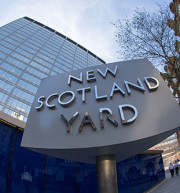
Special Rapporteur Maina Kiai undertook his second official visit to the United Kingdom of Great Britain and Northern Ireland from April 18-21, 2016, as a follow-up to his official visit to the United Kingdom in 2013. The visit was carried out pursuant to his mandate to assess the situation of freedoms of peaceful assembly and association in the country. At a press conference at the end of his visit on April 21, 2016, the Special Rapporteur noted that the UK takes its role as one of the global leaders in human rights seriously, but cautioned against a series of domestic measures that have resulted in the “closing of space for civil society." “I am concerned about a series of separate measures by the Government – some implemented and others proposed – which, put together, suggest that the Government has a negative view of civil society," he said in his concluding statement. “These moves have, in many instances, been subtle and gradual, but they are unmistakable and alarming.” He highlighted in particular the Government’s focus on countering “non-violent extremism” without a narrow and explicit definition of the term. He specifically referred to the Prevent strategy which focuses on individuals and groups that appear contrary to the “British Values” of democracy, pluralism and... Continue reading →
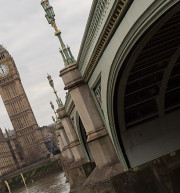
LONDON – The UN Special Rapporteur on the rights to freedom of peaceful assembly and of association, Maina Kiai, warned today against a series of measures resulting in the “closing of space for civil society in the UK”, at the end of a four-day visit to the country. The Special Rapporteur highlighted that the UK takes its role as one of the global leaders in human rights seriously and added that “many people around the world look to the UK as a model for democracy and human rights” and emphasised that “the UK truly should consider its civil society a national treasure.” He noted a number of his 2013 recommendations had been implemented and commended the Government for its continued willingness to constructively engage on human rights in general and on the rights to freedom of peaceful assembly and of association in particular. “I am concerned about a series of separate measures by the Government - some implemented and others proposed - which, put together, suggest that the Government has a negative view of civil society. These moves have, in many instances, been subtle and gradual, but they are unmistakable and alarming,” said the expert. The Government’s focus on countering “non-violent extremism” without a narrow and explicit definition was worrisome, Mr Kiai noted. He... Continue reading →
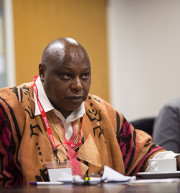
LONDON - I would like to once again thank the Government of the United Kingdom (UK) for inviting me to undertake this official follow-up visit from 18 to 21 April 2016, which is a follow up to my initial visit in January 2013. This is the first follow-up mission I have conducted during my tenure as Special Rapporteur, and I commend the Government for its continued willingness to constructively engage on human rights in general and on the rights to freedom of peaceful assembly and of association in particular. It is clear that the UK takes its role as one of the global leaders in human rights seriously. Many people around the world look to the UK as a model for democracy and human rights. The world notices when this country takes positive steps to strengthen its practice of human rights. But it notices even more when it moves in the opposite direction – restricting the space for democracy and human rights. Let me thank the Government for its excellent cooperation in organizing the mission, short as it was. A remarkable number of meetings were set up with members of the executive and legislative branches, and independent institutions, over the past four days. The input and assistance of these officials was extremely helpful. Given the brevity of the visit, I only looked at the situation in... Continue reading →
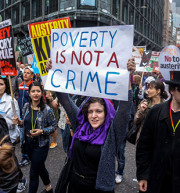
GENEVA – The United Nations Special Rapporteur on the rights to freedom of peaceful assembly and of association, Maina Kiai, will visit London from 18 to 21 April 2016 as a follow-up to his official visit to the United Kingdom in 2013. “This visit will give me an opportunity to follow-up on my recommendations and look at any good practices in relation to the exercise of the rights to freedom of peaceful assembly and of association developed by the authorities since my last visit, but also examine remaining challenges in this regard, and advise them how to overcome these,” Kiai said. “I look forward to a renewed constructive dialogue with all the stakeholders I am due to meet,” the independent human rights expert noted. The Special Rapporteur, who is visiting at the invitation of the UK Government, will stay in London where he is due to meet officials and members of Parliament, as well as representatives of independent institutions, including the national human rights commission, and of civil society. The Special Rapporteur will share his preliminary findings and recommendations at a press conference on Thursday 21 April at 1 pm at the Foreign Press Association, Award House, 7-11 St Matthew Street SW1P 2JT, London. Access to the press conference is strictly limited to journalists. A... Continue reading →
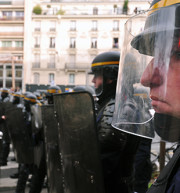
(English) GENÈVE – L'état d'urgence en vigueur en France et la loi sur la surveillance des communications électroniques imposent des restrictions excessives et disproportionnées sur les libertés fondamentales, a averti aujourd'hui un groupe d'experts en droit de l’homme des Nations Unies*. Parmi les préoccupations qu’ils ont partagé avec le gouvernement français, les experts indépendants ont souligné le manque de clarté et de précision de plusieurs dispositions des lois sur l'état d'urgence et la surveillance, portant sur la nature et la portée des restrictions à l'exercice légitime du droit à la liberté d’expression, la liberté de réunion pacifique et d'association et le droit à la vie privée. « Alors que la France débat sur le renforcement des mesures dans la lutte contre le terrorisme, et à cet effet s’engage dans une réforme de la procédure pénale, nous appelons à réviser ces dispositions et possibles réformes, afin d’assurer leur conformité au regard du droit international des droits de l’homme » ont-ils souligné. Pour garantir l’état de droit et prévenir des procédures arbitraires, les experts recommandent l’exercice d’un contrôle judiciaire préalable sur les mesures anti-terroristes. La loi sur l’état d’urgence, en vigueur... Continue reading →

(français) GENEVA – The current state of emergency in France and the law on surveillance of electronic communications impose excessive and disproportionate restrictions on fundamental freedoms, a group of United Nations human rights experts* warned today. In a list of concerns shared with the French Government, the independent experts stressed the lack of clarity and precision of several provisions of the state of emergency and surveillance laws, related to the nature and scope of restrictions to the legitimate exercise of right to freedom of expression, freedom of peaceful assembly and association and the right to privacy. “As France debates the strengthening of measures in the fight against terrorism, and considers a reform of the criminal procedure, we call on the authorities to revise the provisions and possible reforms adopted to that end, to ensure they comply with international human rights law,” they noted. In order to guarantee the rule of law and prevent arbitrary procedures, the experts recommend the adoption of prior judicial controls over anti-terrorism measures. The state of emergency law in force since the recent terrorist attacks in France, which temporarily expands the powers of the executive in the fight against terrorism, only allows judicial review a posteriori. The... Continue reading →
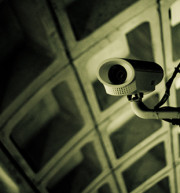
GENEVA – The United Kingdom’s draft Investigatory Powers bill could, if adopted in its present form, threaten the rights to freedoms of expression and association both inside and outside the country, a group of United Nations human rights experts warned. The draft legislation, which is currently being examined by the Joint Parliamentary Committee, aims to unify the various regulations governing how the UK surveillance agencies, police and other authorities can monitor suspects. Special Rapporteur on freedom of expression David Kaye, Special Rapporteur on freedom of peaceful assembly and of association Maina Kiai, and Special Rapporteur on human rights defenders Michel Forst expressed serious concerns about several provisions of the draft Bill. They highlighted that these contain excessively broad definitions and disproportionate procedures to authorise surveillance, including mass surveillance, and data retention without adequate independent oversight and transparency. “The lack of transparency could prevent individuals from ever knowing they are subject to such surveillance,” the experts noted in a six-page submission* to the Joint Parliamentary Committee. “This will ultimately stifle fundamental freedoms and exert a deterrent effect on the legitimate exercise of these rights and the... Continue reading →
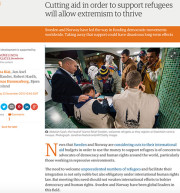
UN Special Rapporteur Maina Kiai has co-authored a commentary for the Guardian's Global Development blog urging the governments of Sweden and Norway not to cut international development aid to support the recent influx of refugees. The piece was co-authored by former Council of Europe Commissioner for Human Rights Thomas Hammarberg, former Swedish ambassador for human rights Jan Axel Nordlander, Civil Rights Defenders executive director Robert Hardh; and Norwegian Helsinki Committee secretary general Bjørn Engesland. Sweden is currently studying the potential effects of cutting its aid budget by up to 60%, while Norway is reportedly looking at a roll-back of approximately 21%. The authors note that both countries are among the most generous in the world in terms of foreign aid - particularly when it comes to giving directly to civil society. Sweden, for example, dedicates roughly one-sixth of its aid budget to civil society, including support for those working on democracy-building and human rights. Reducing this support would decimate civil society at a time when such support is most needed. "The consequences of a weakened global civil society movement could ultimately come back to haunt Sweden and Norway," the authors write. "Funding independent civil society in other countries is not just... Continue reading →
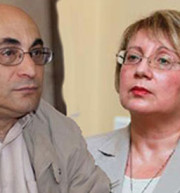
GENEVA – A group of United Nations human rights experts, including Maina Kiai, today condemned the recent prison sentencing of prominent Azerbaijani human rights activists Leyla and Arif Yunus as “manifestly politically motivated and representative of the continuing repression of independent civil society in Azerbaijan.” On 13 August 2015, the Baku Grave Crimes Court sentenced Ms. and Mr. Yunus to eight and a half and seven years’ imprisonment respectively on charges of fraud, tax evasion, and illegal entrepreneurship. They also face charges of treason. “The authorities of Azerbaijan must put an end immediately to all forms of persecution against human rights activists in the country,” the experts said. “Leyla and Arif Yunus are two of many activists in Azerbaijan, which include Anar Mammadli, Rasul Jafarov and Intigam Aliyev, who have been targeted because of their legitimate human rights work.” “Criminalization of those working for the promotion and protection of human rights in the country is deeply disconcerting,” the experts said, reiterating a call on the authorities they made one year ago “to reverse the trend of repression, criminalization and prosecution of human rights work in the country.” “Silencing these prominent voices is having a devastating impact on the... Continue reading →
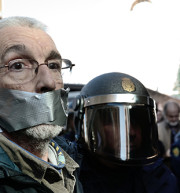
GENEVA - A group of United Nations human rights experts urged Spain today to reject two projects of legal reform that “threaten to violate individuals’ fundamental rights and freedoms.” The experts’ call comes after the Congress fast-tracked the approval of a proposal to reform of the Penal Code, regarding crimes of terrorism. “We trust that Spain will take all necessary steps to guarantee the exercise of fundamental rights and public freedoms in its national legislation, in accordance with international standards,” the experts said in reference to this proposal as well as to two additional projects of reform currently being discussed in the Senate: the Reform of the Penal Code, regarding the crimes of public disorder, and the Reform of the Basic Law on the Protection of Public Security. “The rights to peaceful protest and to collectively express an opinion are fundamental to the existence of a free and democratic society,” the Special Rapporteurs said. “We are concerned that the reform proposals could be a response by the Government and the legislature to numerous demonstrations that have been carried out in Spain in recent years.” Penal Code reform project The independent experts stated that “the text of the reform project includes broad or ambiguous definitions that pave the... Continue reading →